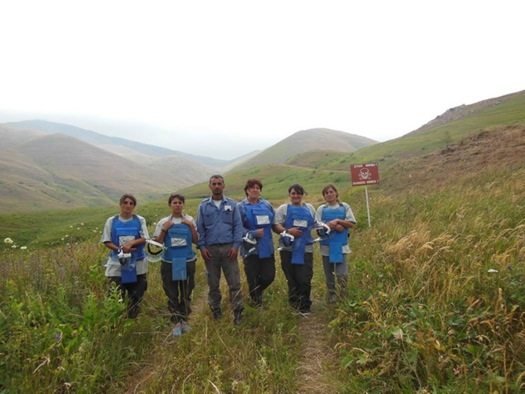In July, the HALO Trust dispatched their first all-female team of de-miners to the Nagorno-Karabagh Republic (NKR/Artsakh).
“Having successfully deployed female de-miners in many countries, we felt that the time was right to try this in Nagorno-Karabagh,” Yuri Shahramanyan, the manager of HALO’s mine clearance program in the NKR, said to the Armenian Weekly. “Society in Nagorno-Karabagh is conservative and the clearance of mines is laborious work that is perceived as being dangerous; it is thus generally considered to be work suitable for men.”

According to HALO, “Nagorno-Karabakh has one of the world’s highest per capita rates of accidents caused by mines, cluster munitions, and other explosive remnants of war (ERW).”
HALO Nagorno Karabagh (NK) currently employs 129 national staff, 11 of whom are women. Since 2000, HALO NK has cleared 417 minefields and 480 sites contaminated with cluster munitions. From 1992-94, mine-laying took place in Nagorno-Karabagh by both Azerbaijani and Armenian forces, resulting in the presence of thousands of mines. HALO is currently the only organization working to clear mines and dispose of unexploded ordnance (UXO)—explosive weapons that did not explode upon employment but that still pose a risk of detonation.
In addition to helping clear minefields, HALO educates communities on the dangers of trespassing into minefields, and works with the NK Rescue Service by coordinating its clearance and Explosive Ordnance Disposal activities across the Nagorno-Karabagh Republic.
With the current level of funding, minefields in Nagorno Karabagh may be cleared within two to three years. However, funding is low for this operation and the funds that are raised often have territorial restrictions placed upon them, which Shahramanyan says “are linked to NK’s unrecognized status and its currently controlled territories.”
Funds provided by government donors are only able to be used within the boundaries of Nagorno-Karabagh. “Future progress is very much dependent on funding,” he says. “The more resources are available, the sooner all remaining minefields and cluster munitions sites will be cleared, preventing numerous mine and UXO accidents that are waiting to happen.”
According to Shahramanyan, the all-female de-mining team is now clearing minefields surrounding their own villages in the Kashatagh region. It is common for HALO to recruit from the local communities and families affected by the mines. The recruits help conduct minefield surveys and support organizing Mine Risk Education sessions in their communities, Shahramanyan explains. However, HALO does not always seek to specifically recruit women for their teams. In the future, HALO will state clearly their desire for both men and women. If this measure fails to produce female applicants, Shahramanyan says, they “will consider further targeted recruitment.”


Kudos to these brave women.
It takes a special kind of person to do this kind of work.
I honestly would not do this for all the money in the world.
One tiny misstep, and it’s lights out.